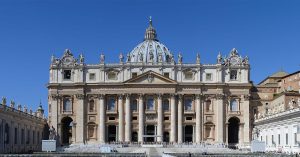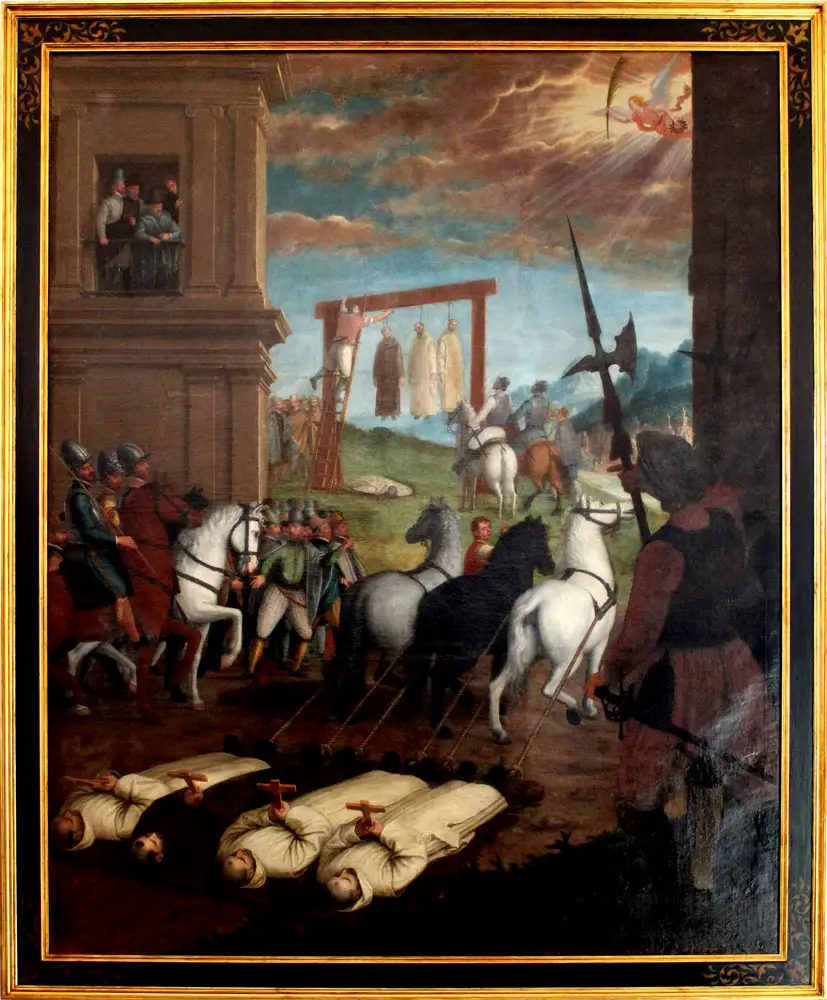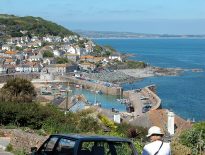
St Peter's, Rome
On this day in history, 2nd August 1581, Protestant Richard Atkins was burned to death before St Peter's in Rome. It is said that as he was taken to St Peter's, his back and breast were burned by men holding torches and that his right hand was then cut off and his legs burned first to prolong his suffering.
Why such an awful and prolonged death?
Anthony Munday, in his 1582 book The English Romayne Lyfe, recounts Atkins' 'crimes' in a chapter dedicated to him. He tells of how Atkins, a Hertfordshire man, travelled to Rome and went straight to the English College there, the Catholic seminary, and told the priests that he had come "to rebuke the great misorder of your lives" and he called their pope "the Antechrist". They reported him to the Inquisition who examined him and then released him. But then:
"And one day going in the streete, he met a Preest carying the Sacrament, which offending his conscience, to see the people so croutch and kneele to it: he caught at it to haue throwne it downe, that all the people might see what they worshipped. But missing his purpose, and beeing iudged by the people, that he did catch at the holinesse, that (they say) commeth from the Sacrament, vppon meere deuotion: he was let passe, and nothing sayde to him.
Fewe dayes after, he came to Saint Peters Church, where diuers Gentlemen & other, were hearing Masse, and the Preest beeing at the eleuation: he vsing no reuerence, stepped amongst the people to the Aultar, and threwe downe the Challice with the Wine, striuing likewise to haue pulled the Cake out of the Preestes handes. For which, diuers rose vp, and beate him with their fystes, and one drew his Rapier, and would haue slaine him: so that in breefe, he was caried to prison, where he was examined, wherefore he committed such an hainous offence: whereto he aunswered, that he came purposelie for that intent, to rebuke the Popes wickednesse, and their Idolatrie. Vpon this, he was condempned to be burned: which sentence he sayde, he was right willing to suffer, and the rather, because the summe of his offence, pertayned to the glorie of God."
Atkins was imprisoned, but refused to recant his beliefs. Munday records his death:
"Within a while after, he was set vpon an Asse, without any saddle, he beeing from the middle vpward naked, hauing some English Preests with him, who talked to him, but he regarded them not, but spake to the people in so good language as he could, and tolde them they were in a wrong way, and therfore willed them for Christes cause, to haue regard to the sauing of their soules.
All the way as he went, there were fowre did nothing else, but thrust at his naked body with burning Torches: whereat he neither mooued nor shrunke one iote, but with a cheerefull countenaunce, laboured styll to perswade the people, often bending his body to meete the Torches as they were thrust at him, & would take them in his owne hand, and holde them burning styll vppon his body, whereat the people not a little wundered. Thus he continued almost the space of halfe a mile, tyl he came before Saint Peters, where the place of Execution was. When he was come to the place of Execution, there they had made a deuise, not to make the fire about him, but to burne his legges first, which they did, he not dismaying any whit, but suffered all meruailous cheerefully, which mooued the people to such a quandarie, as was not in Roome many a day. Then they offered him a Crosse, and willed him to imbrace it, in token that he dyed a Christian: but he put it away with his hand, telling them, that they were euill men to trouble him with such paltrie, when he was preparing him selfe to God, whome he behelde in Maiestie and Mercie, ready to receaue him into the eternal rest. They seeing him styll in that minde, departed, saying: Let vs goe, and leaue him to the deuill, whome he serues. Thus ended this faithfull Soldier and Martir of Christe who is no doubt in glorie with his Maister, whereto God graunt vs all to come. Amen."
Atkins had not only been a heretic, he had attacked the Catholic church and its doctrines in the holy city of Rome.
Notes and Sources
- Peterson, Richard S.. “Atkins, Richard (1559?–1581).” Richard S. Peterson In Oxford Dictionary of National Biography, online ed., edited by David Cannadine. Oxford: OUP, 2004.
- Ridgway, Claire (2012) On This Day in Tudor History, MadeGlobal Publishing.
- Munday, Anthony (1582) The English Romayne Lyfe, p. 100-104. Read at https://archive.org/details/in.ernet.dli.2015.475602



What a horrible death, poor man. However, when you have the good fortune to be released by the Inquisition you don’t stay in Rome and cause trouble, you go home to England and count your blessings.
Perhaps he felt that it was what God wanted him to do. It would have been far easier to have fled, but perhaps he felt he had to carry on the fight, that it was his destiny no matter the cost. These people had such courage and faith, it’s mind-blowing.
Yes, I would agree with that, for you won’t stay in a dangerous place if you don’t have a mission or faith to stay there or you feel God wants you there. I think my destiny would to go home. He felt otherwise. It takes strong courage to face a terrible fate for faith, especially knowing you had a way out, not to recant or stay quiet must have been a real struggle.
I really am in awe of these martyrs, whether Catholic or Protestant. I’d like to think that I would stay strong and speak out against things that were contrary to my faith, but it’s easier said than done when your life is on the line. Your death wasn’t even a quick one, it was an awful end.
Good God, what a horrible death. It always amazes me how people can sit around and think of terrible ways to torture somebody!